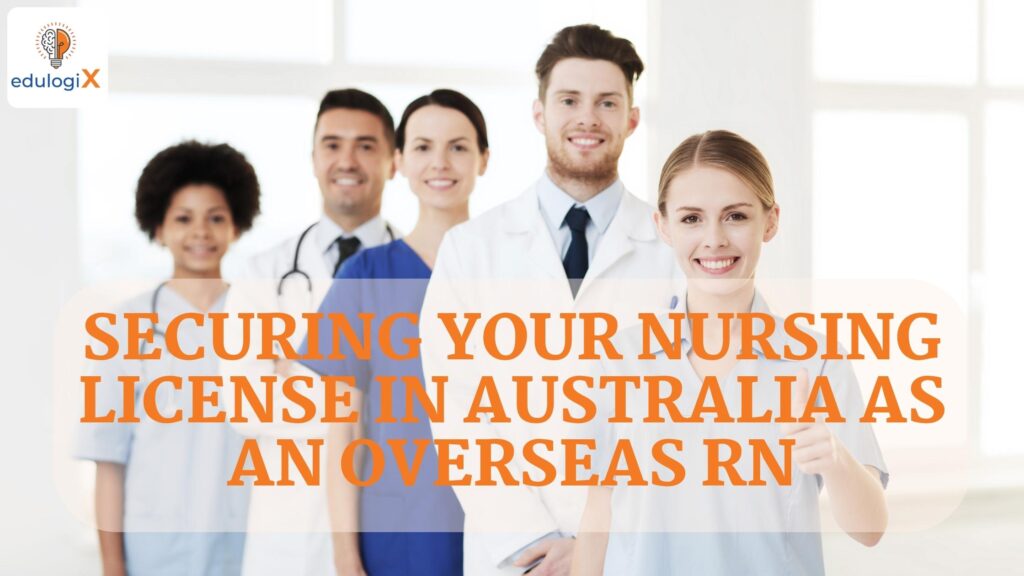
Are you an overseas Registered Nurse (RN) currently working in the UK or Ireland? Are you dreaming of relocating to Australia, obtaining your Nursing License in Australia, and practicing your nursing skills down under? If so, you’re in the right place!
Table of Contents
In this comprehensive guide, We will walk you through the easiest pathway to obtain your nursing license in Australia if you are an overseas Registered Nurse who has obtained a valid UK(United Kingdom) /Ireland/ Canada/ Singapore nursing licence.
The Road to Australian Nursing Licensure
First, let’s clarify a few key points. There’s no direct registration route for UK/Ireland/Canada/Singapore nurses to practice in Australia unless you hold a Bachelor of Nursing degree from these countries. However, there’s a viable alternative: the New Zealand pathway.
The New Zealand Route
The New Zealand nursing council provides direct licences to Uk/Ireland/Canada and Singapore nurses if you meet their eligibility criteria without undergoing any training or exams in New Zealand. Under this process, you apply for a New Zealand nursing licence online, and once granted, you can apply for registration with the Australian Health Practitioner Regulation Agency (AHPRA) through the Trans-Tasman Mutual Recognition Act. This Act facilitates mutual registration for nurses between Australia and New Zealand, making it your ticket to an Australian nursing license.
Eligibility Criteria and New Zealand Nursing Council Standards
Let’s dive into the eligibility criteria and standards set by the New Zealand Nursing Council to be eligible under this process:
- Qualification: Your nursing qualification must be equivalent to a Bachelor of Nursing degree in New Zealand, which falls under level 7 on the New Zealand Qualifications Framework (NZQF). Unfortunately, nurses with a nursing diploma don’t meet this requirement. However, diploma nursing holders can explore the same pathway to become enrolled nurses.
- Registration: You must hold a current nursing registration from an English-speaking country like the United Kingdom, Ireland, Singapore, Canada, or the United States of America. Additionally, you should have a nursing license in your home country where you completed your nursing qualification.
- Post-Registration Experience: You need to provide evidence of at least two years (2,500 hours) of nursing practice within the last five years.
- English Language Proficiency: Demonstrating English language proficiency is crucial. You can achieve this through OET or IELTS (Academic) exams. For OET, you need minimum scores of 350 in reading, listening, and speaking, and 300 in writing. For IELTS Academic, you must score at least 7 in reading, listening, and speaking, and 6.5 in writing. Scores from two sittings within 12 months are accepted. Test scores are valid for two years, but you can request a waiver and use previous scores obtained when you migrated to the UK/Ireland or other eligible countries. This means you don’t have to repeat the exam if your scores have expired.
- Fitness to Practice: Under this standard, you must provide international criminal history clearance from countries where you’ve resided for 12 months or more in the last seven years.

Now that you’re familiar with the eligibility criteria, let’s explore the application process with the New Zealand Nursing Council.
Applying for Your New Zealand Nursing License
- Application with CGFNS International: The Credentials Verification Service for the Nursing Council of New Zealand (CVS-NCNZ) is managed by CGFNS International. To begin your application, create a profile on the CGFNS website and make a $300 USD payment. Your profile remains active for 12 months, providing ample time to collect all required documents.
- Forms and Verification: Within three working days, you’ll receive the necessary forms, including ID proof verification forms, educational verification forms, employment verification forms, nursing licensure verification forms, and English language proficiency details. Complete these forms, ensuring they are notarized or attested as needed.
- Request CGFNS Assessment: After CGFNS receives all required documents, they’ll review your application and issue an Assessment Report within 30 days. Review and confirm the information, then authorize the submission of the report to the New Zealand Nursing Council. You’ll receive an email inviting you to complete the registration application.
Applying to the Nursing Council of New Zealand
a. Application Review: After paying a NZD 485 application fee, your application undergoes review by a case officer. Be prepared to address any queries raised during the document review.
b. Fit to Work and Criminal History Check: You’ll need to undergo an International Criminal History Check, costing approximately $159 AUD per country. Once you obtain clearance, you’ll be considered fit to work, and you’ll receive your New Zealand nursing registration license.
c. Annual Practice Certificate (APC): The final step involves obtaining an annual practicing certificate by paying NZD 130, which grants you a certificate valid for one year. With this, you become eligible to work as a Registered Nurse in New Zealand.
Trans-Tasman Mutual Recognition Pathway – Australian Health Practitioner Registration Agency (AHPRA) Registration Process
Now that you hold a registered nurse status in New Zealand, you can immediately apply to AHPRA using the Trans-Tasman Mutual Recognition Pathway. Here’s what you’ll need:
- Notarized copies of ID proof
- Address proof
- New Zealand Nursing Registration Copy
- New Zealand Annual Practicing Certificate
The fee for this process is approximately $450 AUD. In just a few weeks, AHPRA will grant you your nursing license, making you eligible to practice in Australia.
How can we help you?
We at Edulogix have helped hundreds of Nurses from the UK/Ireland complete the whole process without any hassle. We provide full procedure assistance starting from the CGFNS application to the successful completion of the AHPRA licensing procedure. You can read more about this service here.
Conclusion
I hope you’ve found this guide incredibly valuable. If you did, please consider subscribing to our YouTube channel for more insightful information on international education and nursing. Before you go, don’t forget to check out our website, where you’ll find a treasure trove of resources for overseas registered nurses.
